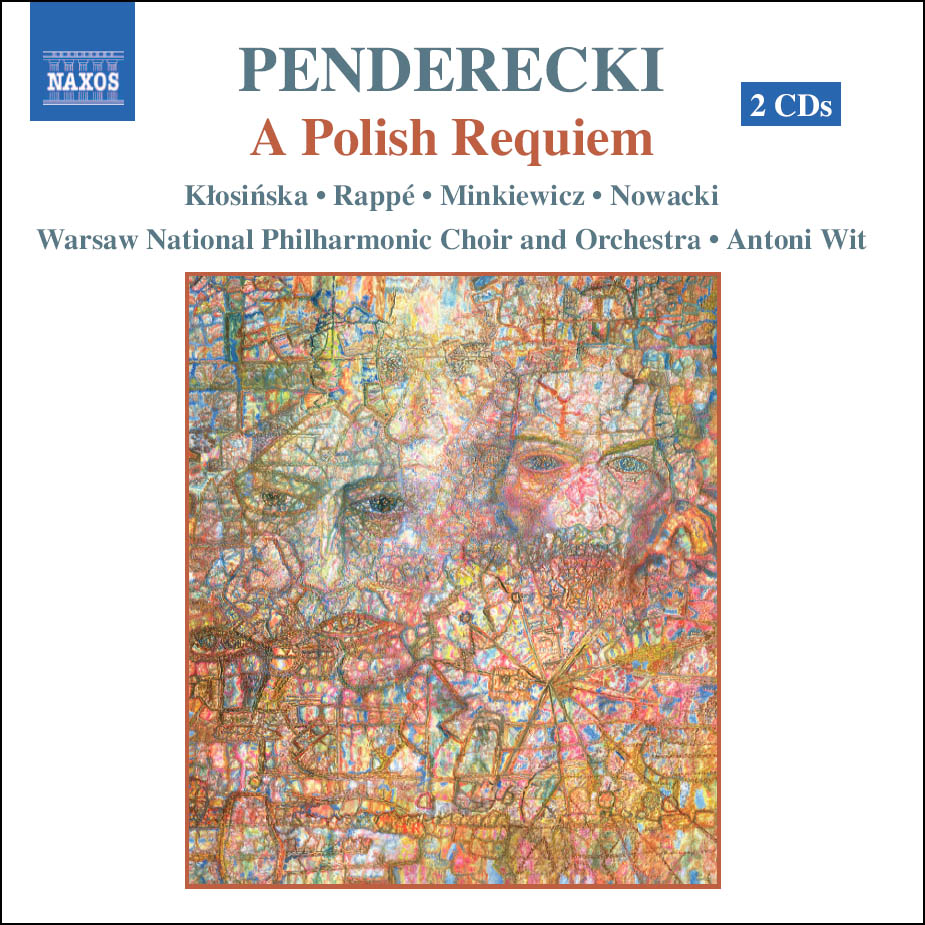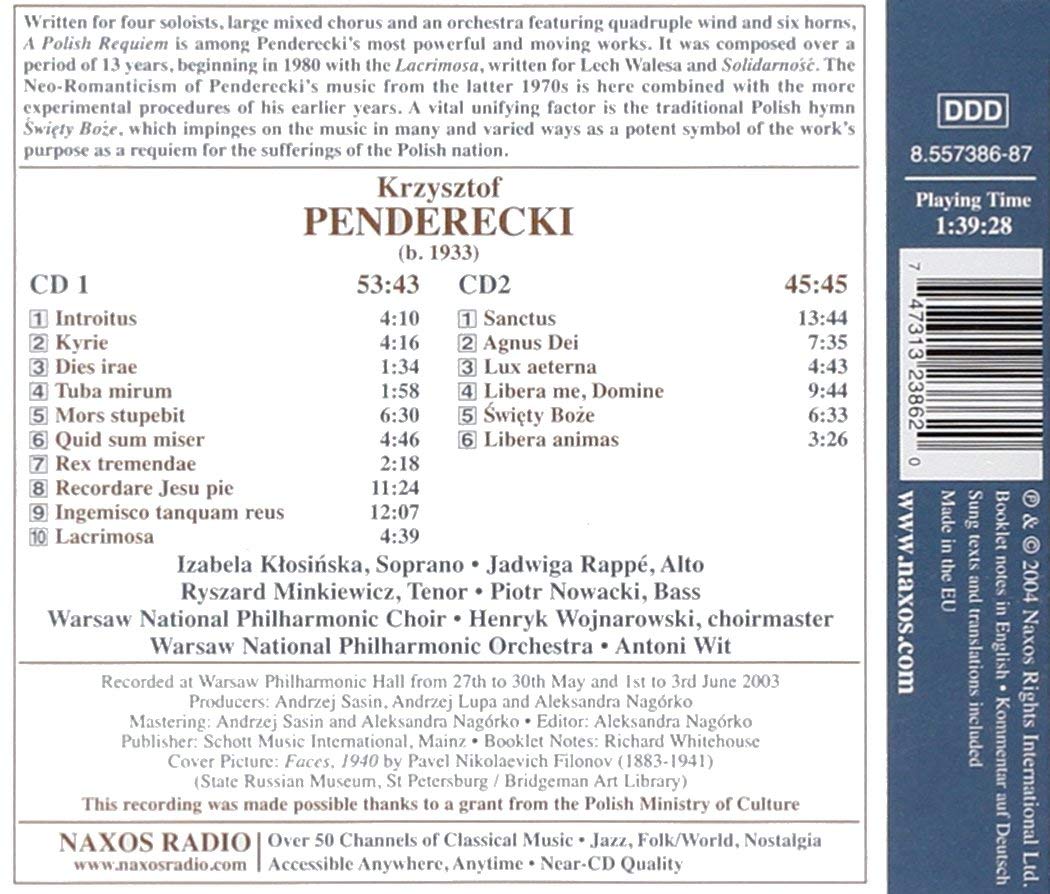
kompozytor
Penderecki, Krzysztof
tytuł
Penderecki: A Polish Requiem
wykonawcy
Wit, Antoni;
Rappé, Jadwiga;
Minkiewicz, Ryszard;
Warsaw Philharmonic Choir;
Kłosińska, Izabella;
Nowacki, Piotr
Rappé, Jadwiga;
Minkiewicz, Ryszard;
Warsaw Philharmonic Choir;
Kłosińska, Izabella;
Nowacki, Piotr
nr katalogowy
8.557386-87
opis
In this recording from Naxos -- which leads other labels this year with 15 classical Grammy nominations -- Penderecki's massive orchestrations and choral gymnastics are led by Antoni Wit. The Warsaw National Philharmonic Choir and Orchestra members sound as if they'd waited all their lives to perform this frightening, devastating music. In fact, one of the most visceral connections you can make with the nightmares of Europe's last century is to hear this music. In it, you feel -- as if you could touch it -- the real darkness of the worst of communism and Nazism.
Those cliff-face glissandi, or cascading harmonies, are a Penderecki trademark. The "Mors stupebit" sequence opens with alto Jadwiga Rappé's despairing "Death is struck and nature quaking." It gives way to bells of alarm and stabbing military percussion under the hair-raising mayday of the choir's impassioned "Nothing unavenged remaineth." This is an Armageddon.
Penderecki's work isn't always liturgical, although much of his choral work is, including "The Passion of St. Luke" and "Utrenja: The Entombment of Christ." In his "Requiem," by the time he reaches the communion segment, "Lux aeterna," he's working in a range of nerve-scraping strings deployed by Gyorgy Ligeti, whose own "Lux aeterna" is heard in the soundtrack of Kubrick's "2001: A Space Odyssey." "I am seized with fear and trembling," the choir insists in a harrowing "Libera me, Domine" that starts in shadowy sotto voce and quickly vaults into soprano Izabella Klosinska's near-screams of panicked supplication.
This two-CD set is fronted by the stained glass wonder of the 1940 "Faces" of artist Pavel Nikolaevich Filonov. Look carefully and the Klee-like mosaic resolves into dark eyes, a blank stare and a demonic-alien visage in a hieroglyphic jungle. And in the chiming, crowded crescendos of the final "Free the souls," the man from Debica no longer is beseeching any deity: His choir is simply demanding liberation from his homeland's 20th-century agonies. • Porter Anderson, CNN.com, January 2006
These are the sounds of hearts suffering the Kafka-chill of police-state oppression. Take the "Dies Irae," generally a hymn or chant for the dead. As the third movement in "A Polish Requiem," it's nobody's Gregorian hand-wringer. Penderecki's strings slash and claw at the air as the tenors, joined by the sopranos, bellow out a fearsome warning of "that judge whose searching light / Brings thought and word and deed to light."
Those cliff-face glissandi, or cascading harmonies, are a Penderecki trademark. The "Mors stupebit" sequence opens with alto Jadwiga Rappé's despairing "Death is struck and nature quaking." It gives way to bells of alarm and stabbing military percussion under the hair-raising mayday of the choir's impassioned "Nothing unavenged remaineth." This is an Armageddon.
Penderecki's work isn't always liturgical, although much of his choral work is, including "The Passion of St. Luke" and "Utrenja: The Entombment of Christ." In his "Requiem," by the time he reaches the communion segment, "Lux aeterna," he's working in a range of nerve-scraping strings deployed by Gyorgy Ligeti, whose own "Lux aeterna" is heard in the soundtrack of Kubrick's "2001: A Space Odyssey." "I am seized with fear and trembling," the choir insists in a harrowing "Libera me, Domine" that starts in shadowy sotto voce and quickly vaults into soprano Izabella Klosinska's near-screams of panicked supplication.
This two-CD set is fronted by the stained glass wonder of the 1940 "Faces" of artist Pavel Nikolaevich Filonov. Look carefully and the Klee-like mosaic resolves into dark eyes, a blank stare and a demonic-alien visage in a hieroglyphic jungle. And in the chiming, crowded crescendos of the final "Free the souls," the man from Debica no longer is beseeching any deity: His choir is simply demanding liberation from his homeland's 20th-century agonies. • Porter Anderson, CNN.com, January 2006
nośnik
CD
x 2
gatunek
Muzyka klasyczna
producent
Naxos
data wydania
11-10-2004
EAN / kod kreskowy
0747313238620
Produkt nagrodzony:
Diapason: 'Diapason D’or' (2011)
Grammy: 'Nominee' (2012)

(Produkt nie został jeszcze oceniony)
cena 89,00 zł
lubProdukt dostepny w niewielkiej ilości.
Wysyłka w ciągu 3 dni roboczych
Darmowa wysyłka dla zamówień powyżej 300 zł!
Darmowy kurier dla zamówień powyżej 500 zł!
sprawdź koszty wysyłki














































